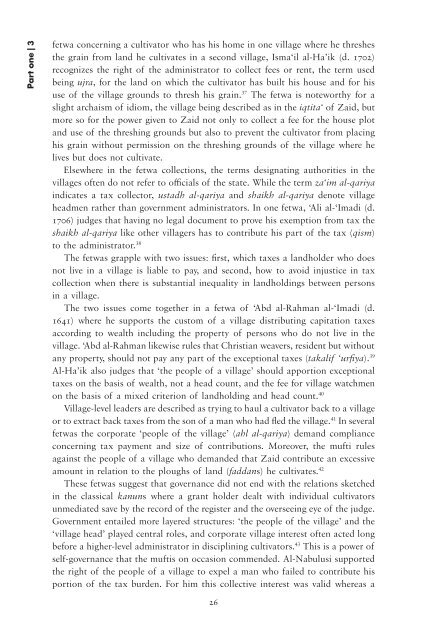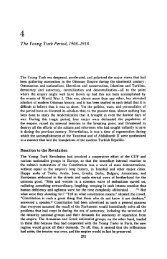Governing property, making the modern state - PSI424
Governing property, making the modern state - PSI424
Governing property, making the modern state - PSI424
You also want an ePaper? Increase the reach of your titles
YUMPU automatically turns print PDFs into web optimized ePapers that Google loves.
Part one | 3<br />
fetwa concerning a cultivator who has his home in one village where he threshes<br />
<strong>the</strong> grain from land he cultivates in a second village, Isma‘il al-Ha’ik (d. 1702)<br />
recognizes <strong>the</strong> right of <strong>the</strong> administrator to collect fees or rent, <strong>the</strong> term used<br />
being ujra, for <strong>the</strong> land on which <strong>the</strong> cultivator has built his house and for his<br />
use of <strong>the</strong> village grounds to thresh his grain. 37 The fetwa is noteworthy for a<br />
slight archaism of idiom, <strong>the</strong> village being described as in <strong>the</strong> iqtita‘ of Zaid, but<br />
more so for <strong>the</strong> power given to Zaid not only to collect a fee for <strong>the</strong> house plot<br />
and use of <strong>the</strong> threshing grounds but also to prevent <strong>the</strong> cultivator from placing<br />
his grain without permission on <strong>the</strong> threshing grounds of <strong>the</strong> village where he<br />
lives but does not cultivate.<br />
Elsewhere in <strong>the</strong> fetwa collections, <strong>the</strong> terms designating authorities in <strong>the</strong><br />
villages often do not refer to officials of <strong>the</strong> <strong>state</strong>. While <strong>the</strong> term za‘im al-qariya<br />
indicates a tax collector, ustadh al-qariya and shaikh al-qariya denote village<br />
headmen ra<strong>the</strong>r than government administrators. In one fetwa, ‘Ali al-‘Imadi (d.<br />
1706) judges that having no legal document to prove his exemption from tax <strong>the</strong><br />
shaikh al-qariya like o<strong>the</strong>r villagers has to contribute his part of <strong>the</strong> tax (qism)<br />
to <strong>the</strong> administrator. 38<br />
The fetwas grapple with two issues: first, which taxes a landholder who does<br />
not live in a village is liable to pay, and second, how to avoid injustice in tax<br />
collection when <strong>the</strong>re is substantial inequality in landholdings between persons<br />
in a village.<br />
The two issues come toge<strong>the</strong>r in a fetwa of ‘Abd al-Rahman al-‘Imadi (d.<br />
1641) where he supports <strong>the</strong> custom of a village distributing capitation taxes<br />
according to wealth including <strong>the</strong> <strong>property</strong> of persons who do not live in <strong>the</strong><br />
village. ‘Abd al-Rahman likewise rules that Christian weavers, resident but without<br />
any <strong>property</strong>, should not pay any part of <strong>the</strong> exceptional taxes (takalif ‘urfiya). 39<br />
Al-Ha’ik also judges that ‘<strong>the</strong> people of a village’ should apportion exceptional<br />
taxes on <strong>the</strong> basis of wealth, not a head count, and <strong>the</strong> fee for village watchmen<br />
on <strong>the</strong> basis of a mixed criterion of landholding and head count. 40<br />
Village-level leaders are described as trying to haul a cultivator back to a village<br />
or to extract back taxes from <strong>the</strong> son of a man who had fled <strong>the</strong> village. 41 In several<br />
fetwas <strong>the</strong> corporate ‘people of <strong>the</strong> village’ (ahl al-qariya) demand compliance<br />
concerning tax payment and size of contributions. Moreover, <strong>the</strong> mufti rules<br />
against <strong>the</strong> people of a village who demanded that Zaid contribute an excessive<br />
amount in relation to <strong>the</strong> ploughs of land (faddans) he cultivates. 42<br />
These fetwas suggest that governance did not end with <strong>the</strong> relations sketched<br />
in <strong>the</strong> classical kanuns where a grant holder dealt with individual cultivators<br />
unmediated save by <strong>the</strong> record of <strong>the</strong> register and <strong>the</strong> overseeing eye of <strong>the</strong> judge.<br />
Government entailed more layered structures: ‘<strong>the</strong> people of <strong>the</strong> village’ and <strong>the</strong><br />
‘village head’ played central roles, and corporate village interest often acted long<br />
before a higher-level administrator in disciplining cultivators. 43 This is a power of<br />
self-governance that <strong>the</strong> muftis on occasion commended. Al-Nabulusi supported<br />
<strong>the</strong> right of <strong>the</strong> people of a village to expel a man who failed to contribute his<br />
portion of <strong>the</strong> tax burden. For him this collective interest was valid whereas a<br />
26












